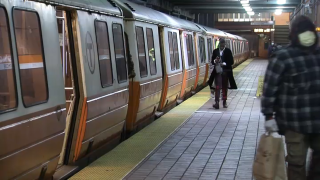
While Orange Line slow zones continue to frustrate riders and puzzle onlookers who expected to see more improvements after a major maintenance shutdown, MBTA General Manager Steve Poftak on Thursday defended the speed restrictions as "prioritizing safety."
Poftak told the MBTA Board of Directors that "we haven't done the best job communicating" about the reasons behind long stretches of the Orange Line where train speeds have not improved much or in some cases have gotten worse since the 30-day closure.
WATCH ANYTIME FOR FREE
Stream NBC10 Boston news for free, 24/7, wherever you are. |
Two days after he disclosed that some of the slowdowns will remain in place into December, Poftak said some of the restrictions stem from recommendations that frontline staff made once they had finished the planned maintenance during the unprecedented shutdown.
"After the surge concluded, our teams out in the field made the decision that we needed to do additional work to address areas that were adjacent to some of the areas where we had done work, and then there was also additional work that they wanted to do in advance of the winter," Poftak told the board.
Get updates on what's happening in Boston to your inbox. Sign up for our News Headlines newsletter.
"I support the judgment of our teams in the field," he added. "I believe that prioritizing safety means trusting their judgment in the field and putting slow zones in place and allowing them to get the work done. I know that it has been inconvenient for our customers and I regret that, but I have also seen progress."
The beleaguered MBTA, which faces a bevy of mandatory safety fixes ordered by federal investigators, has also been under heavy pressure from riders and politicians about its unclear, sometimes shifting story regarding Orange Line slow zones.
Gov. Charlie Baker on Thursday pointed to the deployment of new cars on the Orange Line and reiterated a frequently touted point that workers completed as much work in the month-long shutdown as would have taken five years of weekend- and night-only closures. "I'll be the first to admit that the T, because it was five years' worth of work, the T probably should have been less aggressive about what they thought the benefit would be from doing that," Baker said in an interview on GBH's "Boston Public Radio." "But all the data I've seen shows that coming from the south is dramatically faster than it was before. The real issue at this point is coming from the north, and that work will continue to be done and probably finished some time in December."
Local
In-depth news coverage of the Greater Boston Area.



